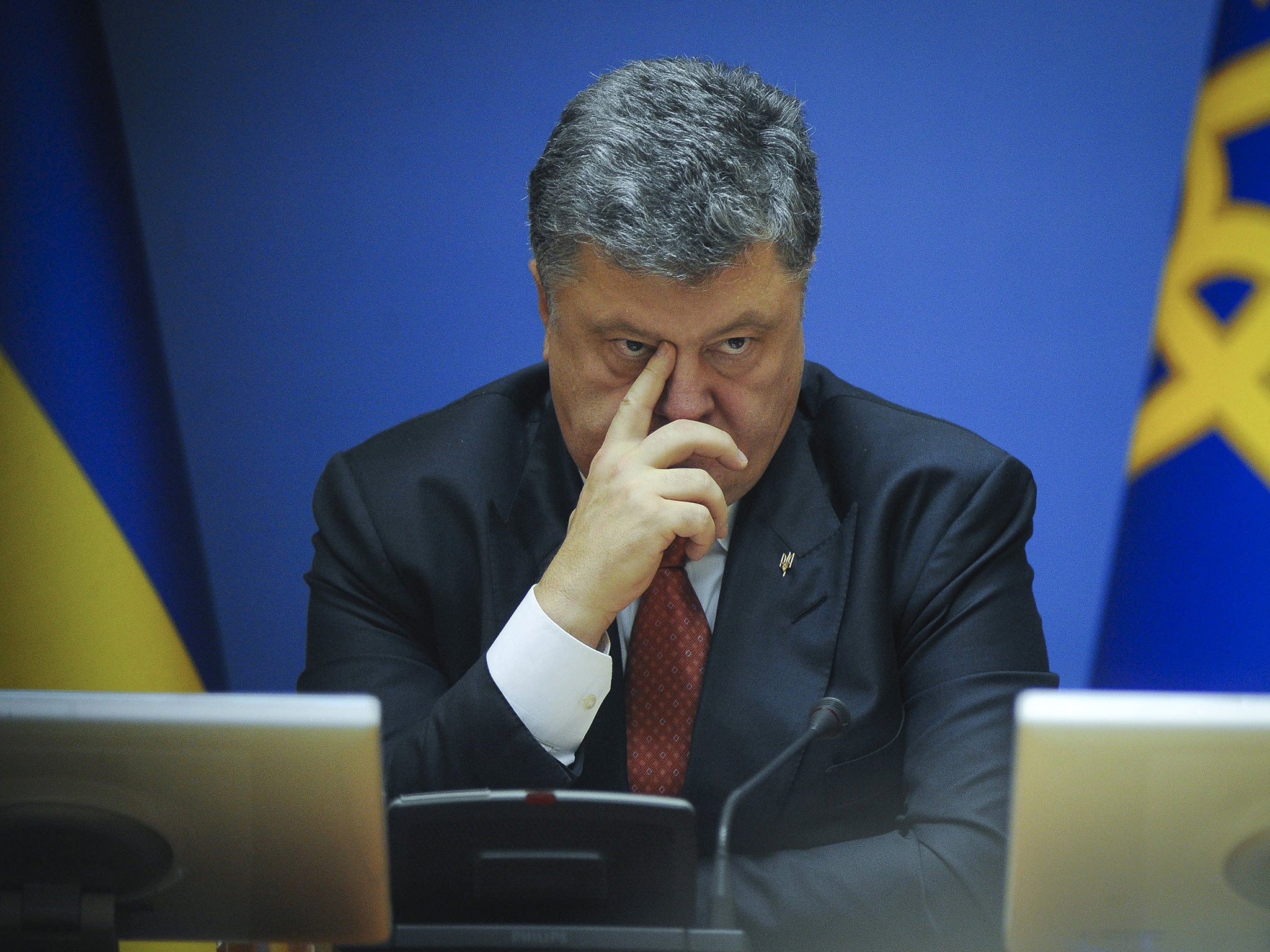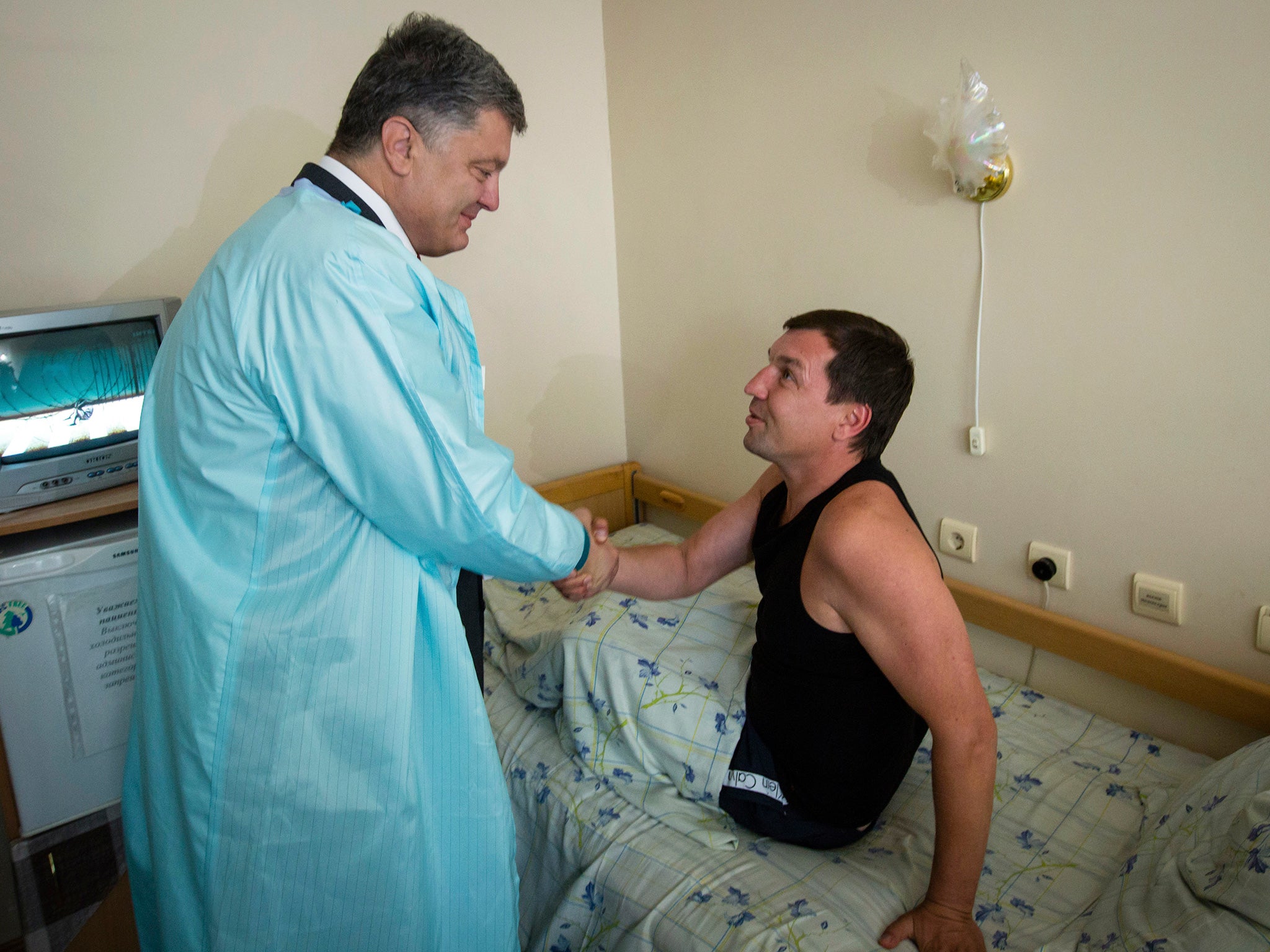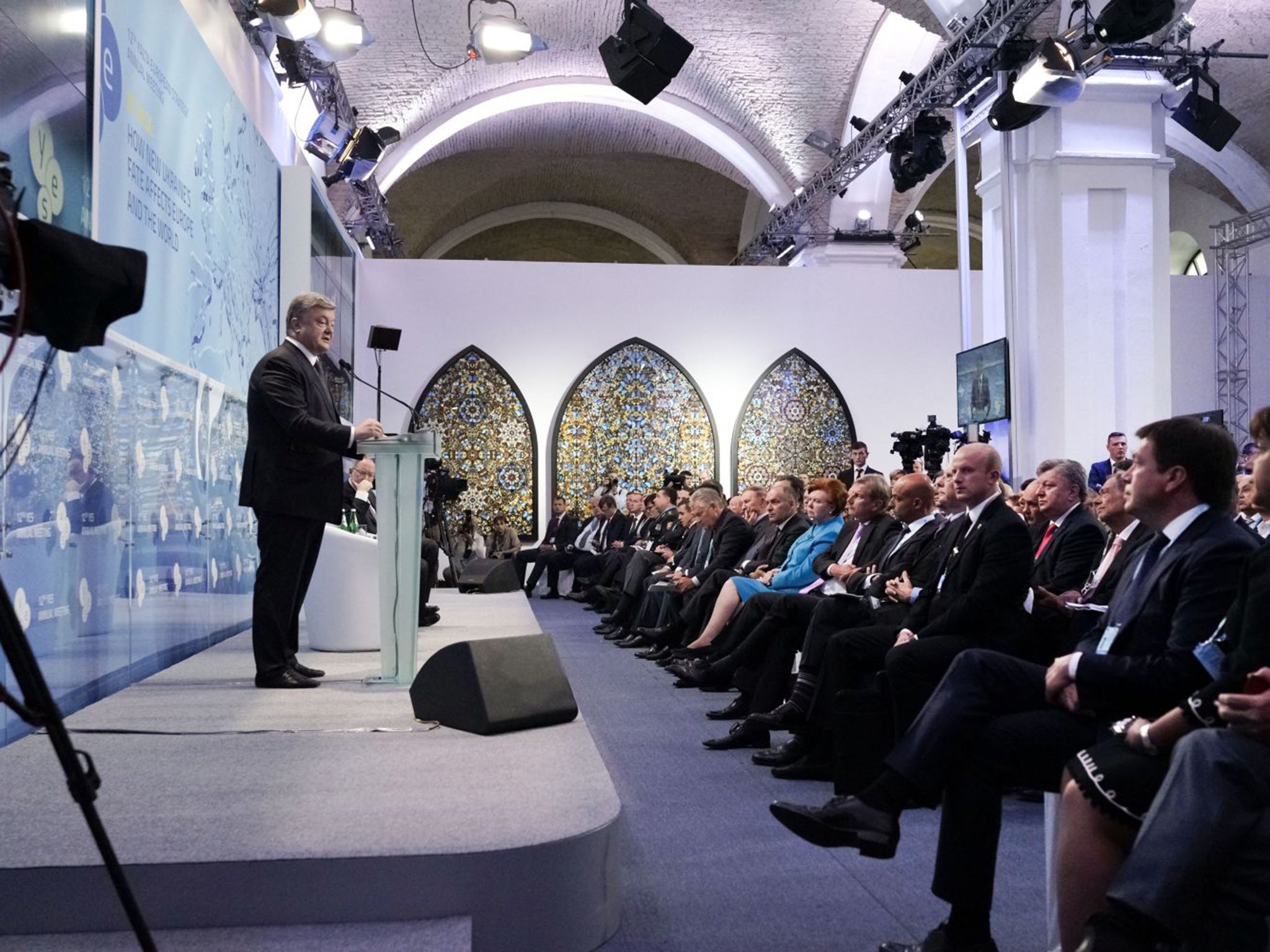Ukraine crisis: Embattled President Petro Poroshenko blames Russia for West's woes but has no answers to his country's problems
With an economy in free-fall, endemic corruption and a continuing war in the east, public opinion is turning against Petro Poroshenko. In Kiev, Kim Sengupta hears the Ukrainian President use a familiar scapegoat to deflect his troubles

Your support helps us to tell the story
From reproductive rights to climate change to Big Tech, The Independent is on the ground when the story is developing. Whether it's investigating the financials of Elon Musk's pro-Trump PAC or producing our latest documentary, 'The A Word', which shines a light on the American women fighting for reproductive rights, we know how important it is to parse out the facts from the messaging.
At such a critical moment in US history, we need reporters on the ground. Your donation allows us to keep sending journalists to speak to both sides of the story.
The Independent is trusted by Americans across the entire political spectrum. And unlike many other quality news outlets, we choose not to lock Americans out of our reporting and analysis with paywalls. We believe quality journalism should be available to everyone, paid for by those who can afford it.
Your support makes all the difference.The West’s failure to counter Vladimir Putin’s “neo-imperial aggression” has led to the “little green men” who are now landing by their hundreds in Syria, Ukraine’s embattled President Petro Poroshenko has claimed.
The Kremlin has become such a source of “threat to the entire democratic world” that it should, Mr Poroshenko told a conference in Kiev, be stripped of its veto in the United Nations Security Council. He claimed Russian aggression was instigating violence in the Middle East and further fuelling the growing refugee crisis in the EU.

But behind Mr Poroshenko’s attempts to blame the Kremlin for two of the gravest situations facing the West – Syria’s civil war and the arrival of thousands of refugees in Europe – lies the unavoidable fact that his government is itself facing serious challenges.
Ukraine’s economy is in a dire state, corruption remains endemic despite much repeated promises of reform, and public discontent threatens to boost the extreme right. It was the Russian-orchestrated separatist movement in the east which is the reason for much of these ills, Mr Poroshenko said. Crimea has been annexed and swathes of land in the east remain occupied.
Despite the Minsk agreement, which was supposed to pave the way to peace, not “one single Russian soldier, not one single Russian tank, has returned to Russia”, he said. Asked about the economy shrinking by 17 per cent, Mr Poroshenko responded: “We have lost 25 per cent of our industrial output in the occupied regions, Crimea and Donbas, 10 per cent of our manufacturing capacity has been destroyed. So why should it be a surprise that the economy is facing some problems?” And what about the failure to tackle inefficiency and corruption? Mr Poroshenko was asked. “Our new coalition government has not been in for a very long time, reforms take time,” he said. “We have made mistakes but we are open about it.”
The President told the international audience at the annual Yalta Conference about the various anti-corruption agencies which had been instituted. He acknowledged afterwards, however, that they were not yet fully effective. But they will, he assured his audience, become “operational in the nearest future”.

Some of the questioning of Mr Poroshenko, a billionaire businessman who dislikes being called an oligarch, was personal. He was asked why he has not sold his assets as he promised to do when he came to office 15 months ago. “It is very difficult to sell anything in a country in a state of war,” he replied. “If anybody can help me do that, you’re welcome.”
The President himself has not faced any allegations of corruption, but the failure to implement reforms to tackle it is a source of worry to Ukraine’s backers in the West. In a message of support, the British Foreign Secretary, Philip Hammond, pledged that sanctions against Russia over its involvement in Ukraine’s eastern regions will continue. But he also strongly urged Kiev to “carry out reforms”.
It is that corruption which remains an issue of deep concern among Ukrainians and that has been behind a surprising rise in support for Mikheil Saakashvili, the former Prime Minister of Georgia who was made the governor of Odessa. He has brought in a series of tough anti-graft measures. There is even talk that Mr Saakashvili, now a Ukrainian citizen, may become a future leader of the country. But it is more likely in the short term, say observers, that he will be brought into central government in a senior position by Mr Poroshenko.
Cabinet meetings may become heated if that happens. Mr Saakashvili and the Prime Minister, Arseniy Yatsenyuk, have been engaged in sniping. Speaking on TV, Mr Saakashvili accused officials in Kiev of attempting to “sabotage” his reform efforts. Mr Yatsenyuk reportedly responded that the claims were “deceitful”.
Some believe Mr Yatsenyuk will leave the governing coalition in preparation for elections which may come earlier than expected. Hoping to do well at the polls are hard-right parties who believe they can benefit from anger some feel over concessions being made to separatists in the east.
The groups are also taking violent street action. Three members of the National Guard were killed in clashes at the end of August outside parliament in which a grenade was thrown during a vote on giving more autonomy to the separatist Donetsk and Luhansk regions. The authorities blamed the hard-right Svoboda party and charged several members with rioting.
The man accused of throwing the grenade, Ihor Humeniak, was a member of a volunteer battalion, the Sich, which has links to Svodoba. Mr Yatsenyuk described them as “worse than the separatists” because they are “trying to open another front” in Ukraine “under the guise of patriotism”.
Mr Poroshenko insists the far right does not enjoy public support. “We are not going to be distracted by this,” he said. “The real problem Ukraine faces is Russian aggression.”
Join our commenting forum
Join thought-provoking conversations, follow other Independent readers and see their replies
Comments